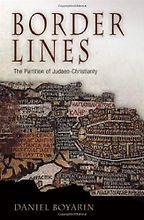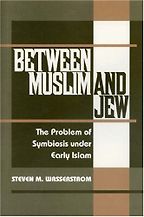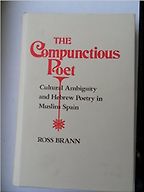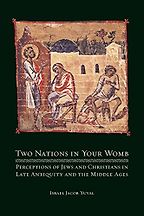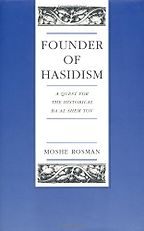Gershon, we met at a recent festival in Riga celebrating the centenary of Isaiah Berlin’s birth, where I heard you speak about “Berlin and Eastern European Jewry.” I asked for an interview and you, very kindly, offered to get a short list of recent books together that revise the ‘metanarrative’ of Jewish history. But before we talk about them, could you tell me what the metanarrative of Jewish history consisted of in the first place?
I can’t! The whole thing? What I tried to do was to choose some books that change the story in some fundamental way, or at least call it into question. But to give a précis of the whole metanarrative of Jewish history? That’s too much to ask!
It’s a big question, but the reason I ask it is that the books you’ve chosen are revising a received history, and that received history, I suppose, depends on a stereotype which actually can be summarised, right? It’s the stereotype of the Jew as the alien, the ‘other,’ the interloper and saboteur, from the perspective of established Western Christian culture and of established Islamic culture. I don’t want to provide any kind of coercive structure to this, but it seems to me that the books you’ve chosen revise that view by showing how Jewish culture has grown up simultaneously with Christian and Islamic cultures and how each has influenced the other. So the first book on your list shows how Christianity and Rabbinical Judaism actually emerge at the same time; and that they emerge as solutions to the same problem.
Yes, Daniel Boyarin’s Border Lines. The standard story is that Christianity is the daughter religion of Judaism. I don’t know why they use feminine metaphors, but in any case … what’s happening in that field is a rethinking of the whole story of the evolution of Judaism and Christianity. Two thousand years ago various groups of people who accepted the Hebrew Bible and the God that’s represented there and believed that He resided in the Temple, saw that Temple destroyed. And once the Temple was destroyed they had to figure out a way to maintain their beliefs. And there were many, many people who tried to figure out how to do that in various ways.
Daniel Boyarin is the most outspoken and the most interesting historian of all this—not always dead on—but he provides a picture of all of the questions that are now open. People would say, once the Temple was destroyed, that the Rabbis created Judaism and St Paul broke away from the Rabbinic Jews and Pharisees and created this new religion. But in fact it took a very long time for these two groups to be teased out of each other.
So the idea is that there’s been some retrospective tidying up there—which in terms of cultural history is a familiar pattern. But your second book, by Steven Wasserstrom, switches focus to Islam. It’s called Between Jew and Muslim: the Problem of Symbiosis Under Early Islam. What does that mean? Does it continue the same theme of retrospective refinement; that just as Jews and Christians had much more in common for far longer than we have been taught to suppose, so did Jews and Arabs?
Well if you were to phrase that “Jews and Muslims,” that would be absolutely true. One of the things that comes out of Boyarin’s book is precisely the vast difference between Christianity, which can say “render under to Caesar…” and separate church and state, and Judaism and Islam where there is no such conception. And that’s really the fundamental thing. Those divisions don’t exist. There’s no word for religion in traditional Jewish language at all. And that’s something shared by Islam. The head of the state is the defender of the faithful.
What’s the central thesis of the book?
Wasserstrom is talking about some remarkable parallel developments between Muslims and Jews in the seventh, eighth and ninth centuries—one of which is an attempt by the Persians to reassert their cultural independence in the face of the domination of Mecca, Damascus and then Baghdad. This attempt takes the form of religious dissent, so it’s not accidental that the centre of Shiism is Persia.
But at the same time that Shiism was arriving, which was frequently Messianic, there were Messianic movements amongst the Jews, one of which lasted four or five centuries. The name of the Messiah in question was “Abu Isa”, which means “Father of Jesus.” It’s hard to get at his message because it was only recorded by people who didn’t like him, but he seems to have preached a tolerant or even a synchronistic approach to religion. But it’s all resisting the centralising efforts of the Rabbis who want to unify and homogenise Rabbinic Judaism. There’s all kinds of resistance to that attempt.
The idea that these two strands of Judaism and Islam emerged simultaneously is consistent with the first book. The idea of separate, competing and yet curiously similar strands emerging from—what? We’re talking about a very sociological reading of these events I suppose. But they emerge, these religions, from a common root—that’s to say, a single God. Do you think that’s relevant? That if one follows all these strands back then one is looking at a group of patriarchal religions competing for a single father figure?
Well no. You’re getting too Jungian for me there. No, it’s not the sort of language that I feel comfortable with. What’s happening here is that religious language is being used—because I’m sociological, as you’ve correctly pointed out—religious language is being used to mask other kinds of resentment and resistance. And what’s striking is that the Muslim dissenters, the Shiites and so on, are rejecting the oral traditions of the Sunni, of the orthodox Muslims. And the Jewish dissenters are rejecting the orthodox traditions of the Rabbis.
What’s more this Abu Isa I was talking about was represented as an illiterate. Now the idea of an illiterate Jewish Messiah is just unthinkable unless you accept the traditional biography of the Prophet. Mohammad is said to have been unlettered; that he was simply a vessel through which God’s voice was transmitted … People memorised what he said and then it was written down in the Koran about a generation later.
Something similar there, also, to the Holy Spirit’s descending to the New Testament disciples in the form of a Pentecostal flame? And of course the advantage of simply being the vessel of God’s word is that one does not defend a point of view, but an absolute truth.
Yes, the Koran is considered the most perfect book in Arabic. It’s divine. Which is a good segue to Brann’s book, which is about Muslim Spain in the eleventh and twelfth centuries. In Jewish history this is thought of as the golden age. A very prosperous Muslim empire, and the Jews were profoundly involved in this society. There were Jewish ministers of external affairs, Jewish prime ministers and Jewish commanders of the armies and so forth. They were very much involved in this society.
What Brann is working on, whether he’s an historian of ideas or a literary historian, are texts in Arabic and in Hebrew that were written in Spain. In that culture, poetry was the social currency of the age. If you were a cultured man then you wrote poetry or at least you were the patron of poets. And of course the Muslim poets wrote in Arabic and imitated the style of the Koran. So as we’ve said, the Jews were part of this culture, and they had the wine gardens and the little boys and little girls and all the rest of it like everybody else, but they were not Muslims. And of course they could not write in the style of this sacred book of somebody else. So they invent Hebrew poetry, in a certain way, imitating the metric patterns of the Arabic poetry, but in Hebrew and based on the style of the Bible, which for them, equally, was divine and perfect.
Five Books interviews are expensive to produce. If you're enjoying this interview, please support us by donating a small amount.
What does Brann make of all this?
Brann uses the word ‘compunctious’ to describe their state of mind. On the one hand they’re absolutely comfortable. On the other hand, they’re not. They’re not really the powers in the state. The greatest of the Hebrew poets was this man, Judah Halevi, who lived that life and eventually rejected it and said, ‘You’re fooling yourselves–you’re just being used by these Muslim rulers. Your idea of a kind of Zion in Spain is a pipe dream….
So the poetry holds within it something of that uncomfortable, or compunctious relationship. But does the poetry survive?
No. It survives for a while in southern France, but eventually it fades away. And you don’t really get any more poetry until modern times.
So here you’re talking about both of the titles you recommend by Brann (The Compunctious Poet and Power in the Portrayal) at the same time, and what I take is the idea of a heterogeneous culture—of two cultures coexisting and of finding ways pragmatically to do that. But on the other hand of a notion of cultural relativism not being sufficient to describe or sustain the identity of the Jews. What we’re coming away with is the notion of a compromised identity—an identity which is rescued by a rejection of that compromise.
Right, there’s a dialectic. I don’t usually use that word. But there’s a kind of dialectic. Brann wants to look at how Muslims talk about Jews and about how Jews talk about Muslims but he has a terrible time finding Jews talking about Muslims. They were very careful. They produced thousands and thousands and thousands of pages of literature. All kinds of philosophy and poetry and legal writing but they were very very discreet with reference to their neighbours.
The fourth book you’ve chosen is Israel Jacob Yuval’s Two Nations in One Womb. An extraordinary title.
Well this is a translation of Yuval’s Hebrew book, which in turn is a translation of a long article that he published many years ago in Israel. It caused a tremendous scandal. Even made the daily press. Very seldom that an historical journal article makes the daily press, but this did. And Yuval said—before I tell you what he wrote about—Yuval said that his article could only have been written once the Jewish state had been established. Because what he’s talking about there is Jewish fantasies of revenge against their Christian neighbours. He discovers this and once he points it out you see it everywhere. These elaborate fantasies of revenge on the part of the powerless. They are fantasies. They are powerless. We’re talking about Christian Western Europe not Muslim Spain, so it’s a totally different power relation. You don’t have Jewish commanders of the army or anything like that. So in their situation of powerlessness you get these very elaborate visions of what will be done to the Christians at the end of days.
So this caused a tremendous scandal…
Yuval talks about Jewish Messianism, the Messianism of vengeance and on the other hand the Messianism of conversion—that’s to say that everybody will see the light and convert to Judaism. What caused the scandal was this: in 1096, during the first crusade, the Jews, once they were trapped, committed suicide and murdered their families rather than see them convert. So you have infanticide. Jewish infanticide. Now Yuval claims that what this is about is the Messianism. That they had a tradition, which is a real tradition, that once enough blood is shed God will take vengeance. And he says that the Jews were murdering their children to bring about the Messianic age, to force God’s hand to take vengeance. I don’t buy that, but that’s what he said. So that’s bad enough. But what he says next is that the Christians, beholding this ‘devilish behaviour’—began to think, ‘if the Jews are willing to kill their own children then they’re probably willing to kill ours’. And this is the beginning of accusations of ritual murder, ‘blood libel.’
Is that really the beginning?
Well that’s Yuval’s argument. That’s what caused the fuss. He was attacked from all sides for saying this.
And what do you make of it?
I don’t think you need the behaviour of the Jews in 1096 to explain the blood libel. After all, the first blood libel was in Norwich a few years later….
Norwich, England?
Yes. William of Norwich. It’s just a story, but a monk recorded, just after William died, that this twelve-year-old Christian boy had been murdered as part of a kind of world Jewish conspiracy. Every year they picked a town, murdered a Christian child and were kind of reenacting the crucifixion. And this monk—Thomas of Monmouth—claimed to have had a former Jew who told him all this. Now Yuval had a problem, because these crusade attacks that happened in 1096 did not touch England or English Jewry. There’s no connection. So he tries to deal with that but it’s kind of thin. But in any case the beginnings of the doctrine of the Christ Child and the Christian Mass—the notion of eating God, or of God somehow living and dying at the same time—really begin in that period. The New Testament itself pictures the Jews as responsible for theicide. I don’t think you need 1096 to explain the blood libel.
But are we saying that the events of 1096 are historically accurate?
What we have are several Hebrew chronicles written a generation later by the survivors. And we have some Christian chronicles that mention this as well. So it’s reasonable to assume this happened. How widespread it was is a different story. There may have been two cases or five or seven, we don’t know. But I’m not skeptical that it happened.
I don’t want to get all Jungian again, but if one were to get a little textual at least—the idea of killing your son is not such an uncommon theme in all manner of traditions and mythologies. And it has all sorts of different connotations. But in terms of the Old Testament the most obvious parallel that springs to mind is Abraham being asked to sacrifice his son, Isaac as proof of faith.
The chronicler actually puts it like this. He says, “We are actually greater than Abraham. We actually did sacrifice our sons.” And he pictures the killing as a temple ritual. They behaved like temple priests slaughtering animals and that sort of language is used.
So an act of faith and a demonstration of strength?
It’s a rhetorical gesture. They’re saying, “We are greater than you in our piety and our faith.” That’s what they’re saying to their attackers.
Transcending yourself by destroying yourself—faith over genealogy. Amazing. Which takes us to your fifth book, doesn’t it? Which is Murray Jay Rosman’s Founder of Hasidism. I vividly recall you talking about the origins of Hasidism in Riga and I thought it was fascinating. This is an attempt at something like a biography of the founder, if I’m right?
I think the subtitle is A Quest for the Historical Baal Shem Tov. Rosman wanted to echo Albert Schweitzer and his Quest for the Historical Jesus. So the founding figure of a historical movement of awakening religious enthusiasm. Rosman goes the whole way. Where there is no solid evidence for an idea he throws it out.
What we have on the Baal Shem Tov is a body of hagiographic material and quotations that appeared in print many years after he died. Actual contemporary evidence that might be used to construct who this person was is very, very thin. So that’s what the book exposes. But more than that, it shows how this religious movement—a movement that is still with us—created this founding figure in its own image.
Rosman shows the evolution of this man from the earliest times after his death until later on, and he is totally transformed. He begins as a sort of shaman, a mystic shaman but still a shaman, and then he is transformed into a Hasidic leader, a Hasidic Rabbi.
So all this was happening posthumously, after the fact. But does Rosman actually succeed in peeling back the layers to a more accurate, historical picture of the founder of Hassidism?
Well he does. I mean, I think he probably pushes a little too hard. He’s a hard-headed historian. So the religious or mystic message is not his focus. His focus is on something else. The key text is a letter that we have from this man—but the problem is that we have it in several different versions… The key passage, which continues to effect Jewish life to this very moment, is where he has a vision and he goes up to heaven where he meets the Messiah. Now if you meet the Messiah, everyone will ask him the same question: “When are you coming?” And he gets an answer: “When your teachings have spread out like …”—I forget the precise metaphor—”… when everybody can perform the same mystical practices that you can.” Now, in the letter itself, or at least in one version of it, the Baal Shem Tov says “and that made me very sad,” because of the long time it would take. But others—the Lubavitch Jews you see going around in prayer shawls very actively trying to get Jews to repent—accepted this as their task.
I want to be straightforward. One of the central themes of our discussion has been a sense of mounting frustration which in the context of Hasidism produces this superman, who can ascend, alive, to heaven and return again. So what does this man represent? What hope does he embody for his followers?
What the Baal Shem Tov does is that he turns around the appropriate demeanor before God of the Jew. That is, before his time, the proper demeanor was dour; sadness at living in exile and at its length, and at having to live in such an immoral and terrible place. And what he teaches instead is that one should be joyous in performing God’s will. There is joy available to everybody if they’re performing the commandments. And that God is in everything. That there is no place where God is absent. and that this is a cause for joy and not sadness. In fact he says that sadness is an obstacle to the worship of the creator. This is not a Messianic creed. The Baal Shem Tov is not a Messiah and he’s not a Messianic figure. There’s no active Messiasm in his teaching. What happens with him and with the people that follow him is that they’re turning mystical doctrines into a kind of psychology. God and joy are always within you, and you can find them within you.
Get the weekly Five Books newsletter
So they have this belief in common, for example, with Quakers?
They were compared even before the end of the eighteenth century to Quakers. And in this respect they’re very much part of the eighteenth century. They license people to make choices. You can choose to become the follower of this or that Rabbi, of this or that path. You don’t have to follow the ways of your ancestors.
An emancipation; part of the enlightenment?
Exactly.
So to look back at what we’ve been discussing here. It seems that the books you’ve chosen have a lot to say about compromise, but do not support a wishywashy cultural relativism. Nor would you encourage any kind of Jungian or psychoanalytic reduction of the history of Judaism which robs its several strands of their respective historic integrity.
I think that most, if not all, of the books that I’ve mentioned restore a kind of agency to Jews. And are concerned not to reduce, but to restore all the heterogeneity, all the multiplicity that this civilization has encompassed. And yet there are, of course, continuities.
June 26, 2017. Updated: May 20, 2021
Five Books aims to keep its book recommendations and interviews up to date. If you are the interviewee and would like to update your choice of books (or even just what you say about them) please email us at [email protected]
